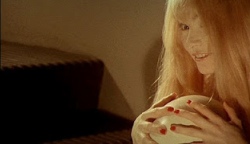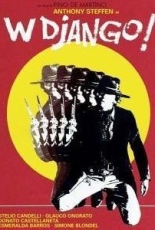
 Roughly the 24th Django sequel, Viva! Django — alternately known as A Man Called Django and the confusing W! Django — puts Anthony Steffen (The Night Evelyn Came Out of the Grave) in the character’s saddle for his fifth and final ride. The title says it all.
Roughly the 24th Django sequel, Viva! Django — alternately known as A Man Called Django and the confusing W! Django — puts Anthony Steffen (The Night Evelyn Came Out of the Grave) in the character’s saddle for his fifth and final ride. The title says it all.
Here, the drifter Django rolls into a town all but abandoned, save for morbidly obese saloon owner Paco (Donato Castellaneta) and his too-hot-for him wife, Lola (smoldering Esmeralda Barros, King of Kong Island), who works there as a, um, “feisty little filly.” Django tells Paco he’s looking for the four men behind the Four Leaf Clover Gang, who murdered his wife. Our cigar-chomping hero carries his smokes around in a music box that displays his dearly departed’s photo and, when opened, conveniently plays the film’s über-hummable Piero Umiliani theme.
 After disguising himself as a friar and igniting much dynamite that sends hapless citizens through candy-glass windows, Django meets Four Leaf vet Carranza (Stelio Candelli, Mario Bava’s Planet of the Vampires). Django knows Carranza was the only one who had nothing to do with it, but demands his help to find the other three.
After disguising himself as a friar and igniting much dynamite that sends hapless citizens through candy-glass windows, Django meets Four Leaf vet Carranza (Stelio Candelli, Mario Bava’s Planet of the Vampires). Django knows Carranza was the only one who had nothing to do with it, but demands his help to find the other three.
Simple plot, simple pleasures, gringo. Director Edoardo Mulargia (Tropic of Cancer) lightens the mood of the original with noticeable comedy upfront, but that doesn’t mean violence takes a backseat. Although not particularly bloody, the flick delivers plenty of gunshots, most of which hit their greasy targets. Not a single one is Django, of course; he’s too much of a badass, like when he uses a branch to rig a fake arm in his coat to make it look like he’s surrendering. Silly villains — Django surrenders to no one. —Rod Lott

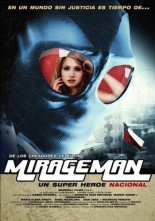
 One of the best superhero movies you’re likely never to have seen hails from South America:
One of the best superhero movies you’re likely never to have seen hails from South America: 
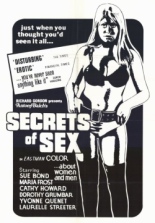
 As far as I know,
As far as I know, 
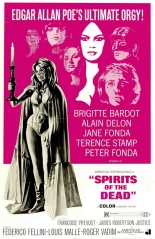
 In stark contrast to AIP’s sometimes-silly Edgar Allan Poe anthology film
In stark contrast to AIP’s sometimes-silly Edgar Allan Poe anthology film 